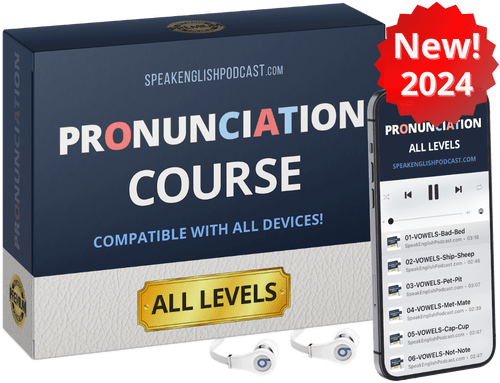Listen to a new episode of Speak English Now Podcast, your favorite material for practicing your spoken and heard English. You will also learn about lifestyle and culture, language, vocabulary, and how to improve your English more effectively.
Transcript:
Hi, I am Georgiana, your English teacher and founder of SpeakEnglishPodcast.com. And I am here to help you speak English fluently with no grammar and no textbooks.
Today we are going to continue learning new phrasal verbs. This time with the verb TAKE.
And with a point of view lesson, you will learn grammar in context without memorizing any boring rules. I’ll tell you a story several times from different grammar points. I can change the tense or the person. And like that, you will learn grammar in context.
Ok. Let’s start!
Most English learners tend to become overly concerned with how to learn phrasal verbs. A phrasal verb is just a verb and a particle. For example, “take after.”
There are thousands of phrasal verbs. Sometimes they may be confusing.
Also, each phrasal verb can have multiple meanings.
Ok, this scenario doesn’t seem very encouraging, and the million-dollar question is:
How can you learn all those phrasal verbs?
Here’s the good news: You need to learn the most common ones. In other words, what people use most of the time.
So, let’s learn some common phrasal verbs with the verb TAKE:
1. Take After somebody
To resemble a parent (looks or behavior)
“I take after my mother so much that people think we are sisters.”
2. Take something Apart
It means to disassemble or to separate the parts of something so that they are not together.
“I’m going to have to take apart the remote control to clean it well.”
3. Take something Back
This phrasal verb means to say that you don’t really mean what you’ve said or written.
“I take it back. You’re not the worst person I’ve ever met. But you are the second-worst person I know.”
4. Take Down
It means to separate the pieces of a structure or write something down.
Examples:
“We’ll have to take down the cupboard if we want to paint the walls.”
“I’ve been trying to get back to you, but I took your number down incorrectly.”
5. Take On
It means to accept a job, responsibility, or to hire somebody.
Examples:
“I can’t take on any more responsibilities; I’m too overstressed.”
“By the end of the year, we plan to take on 100 more people in our company.”
6. Take over
It means to gain control.
Examples:
“My boss told me to take over the project because my colleague was inefficient.”
“When my father retired, my brother took over the business.”
7. Take somebody Up on something
This phrasal verb means to accept an offer.
Example:
“-You’re always welcome to visit us.”
“-Thank you, I’ll take you up on that the next time I come to Vienna.”
Ok, so today, we have learned some phrasal verbs with the verb take.
My advice is to learn phrasal verbs in context and never memorize them, especially because many of them have several meanings.
[END OF THE EXTRACT]
Get the FULL TEXT in PDF here.
Resources:
- Audio MP3 (right-click to save the audio)
- FULL-TEXT PDF (right-click to save the TEXT)
Recommended Material:



I really appreciate and thank you for everything I am listening to you evening and morning I learned a lot
I like the courses very much, I need to listen repeatedly to get my ears custom. I have some problems with my listening and I think these courses will be very useful for me. Thank you. I’ll look forward to buying them soon. Thank you!